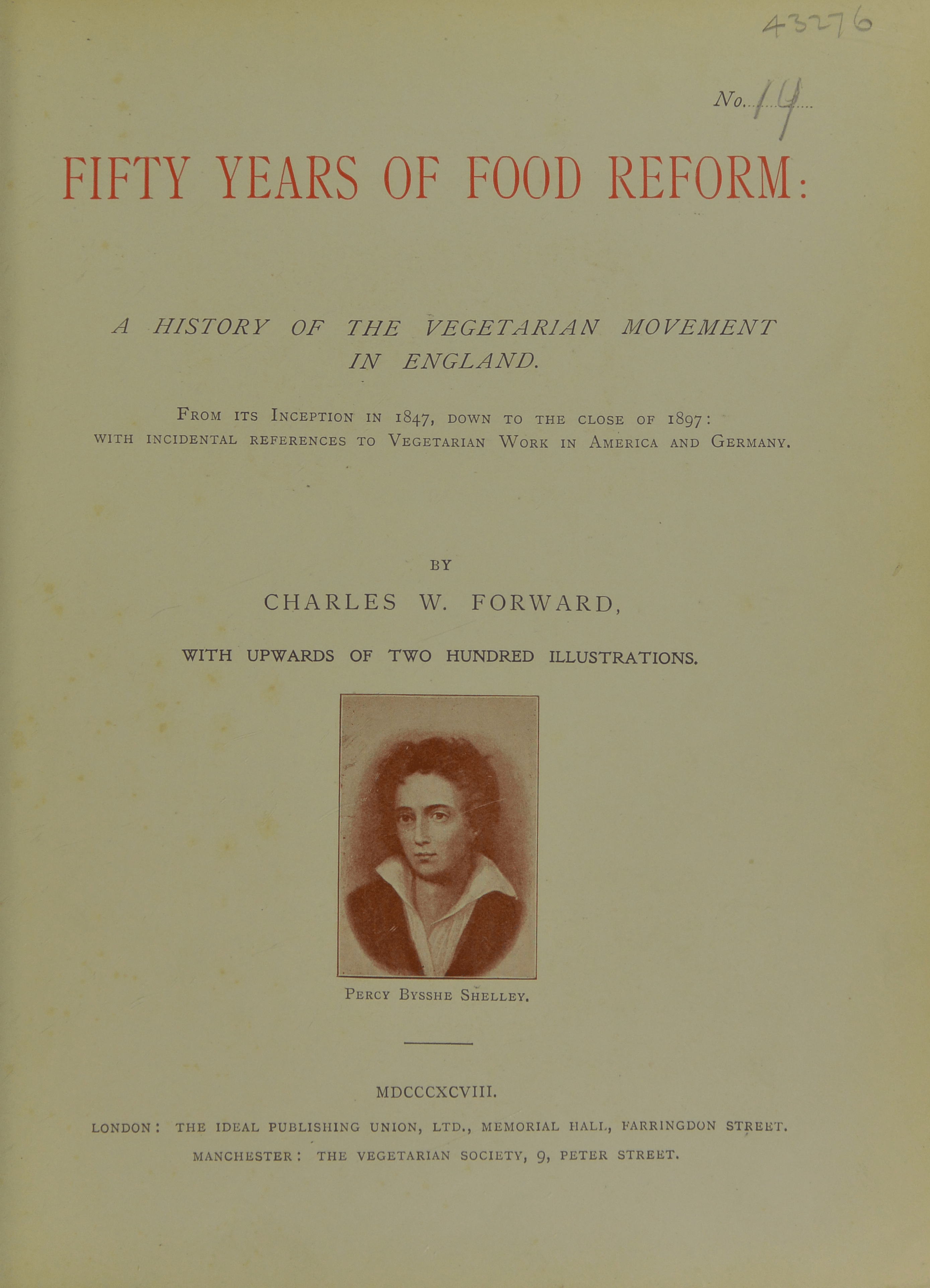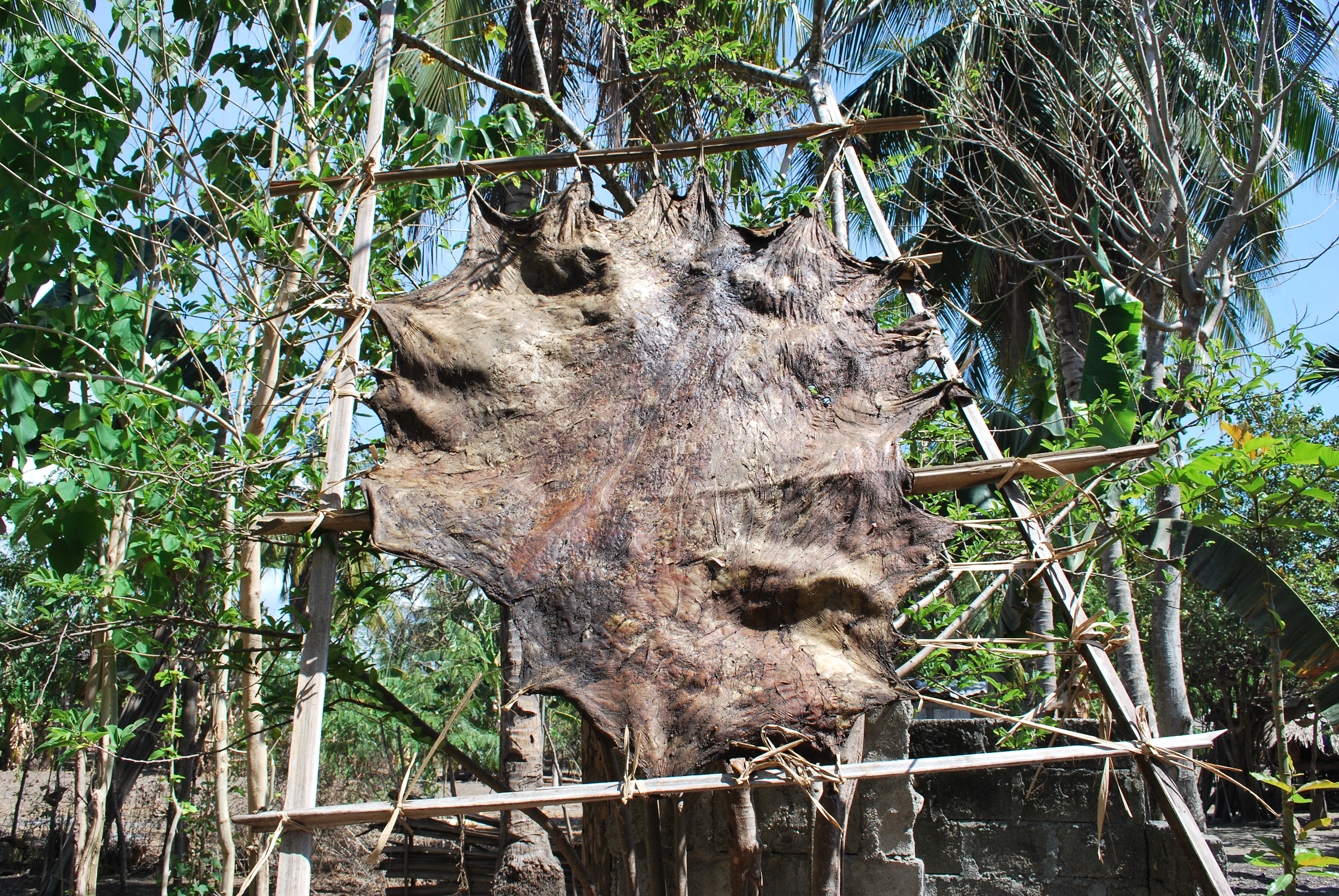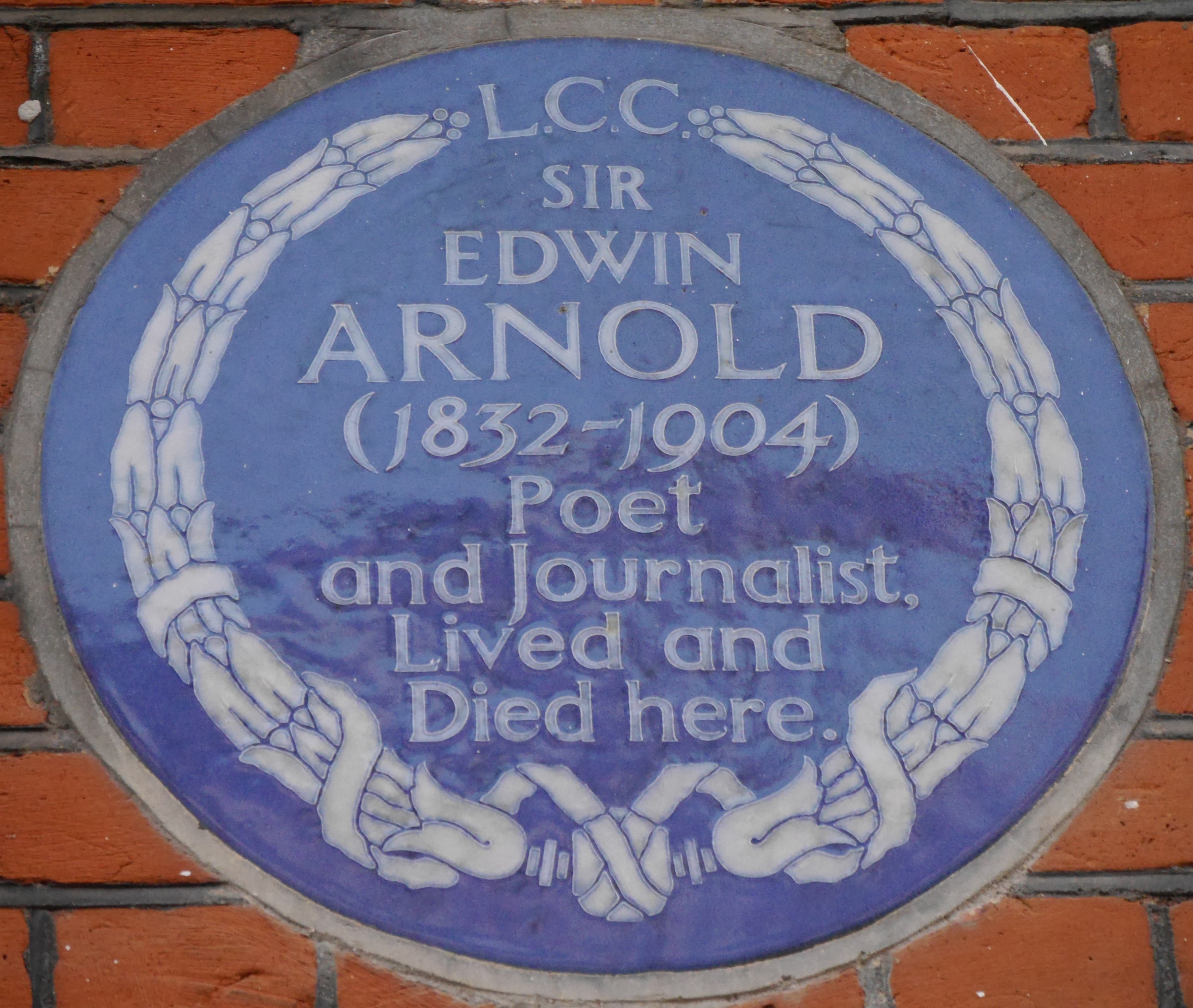|
Josiah Oldfield
Josiah Oldfield (28 February 1863 – 2 February 1953) was an English lawyer, physician, activist, and writer. He promoted his own variant of fruitarianism, which was virtually indistinguishable from lacto-ovo vegetarianism. Oldfield was a prolific writer of popular books on dietary and health topics. He also served in the Royal Army Medical Corps and received the Territorial Decoration for his service in World War I. Biography Early life and education The son of David Oldfield of Great Ryton, Ryton, Shropshire, a provision dealer, and his wife Margaret Bates, he was born on 28 February 1863 in Shrewsbury. His father, who died in 1903, was a church organist in nearby Condover from around the time of Josiah's birth. Oldfield was educated at Newport Grammar School.''The Gissing Journal, Volum ... [...More Info...] [...Related Items...] OR: [Wikipedia] [Google] [Baidu] |
Fifty Years Of Food Reform
Charles Walter Forward (19 August 1863 – 9 June 1934) was an English activist, writer, and editor, notable for his advocacy of animal rights and vegetarianism. Forward made significant contributions to the vegetarian movement and is best known for his 1898 work, ''Fifty Years of Food Reform'', which was the first book to document its history. Early life Charles Walter Forward was born in Islington, Middlesex, on 19 August 1863, to Charles John Forward and his wife Catherine. He was his parents' only surviving child and had a frail youth, with his education often sacrificed for the sake of his health. Forward's health struggles led him to develop an interest in physiology. He became a Vegetarianism, vegetarian in 1878, inspired by a passage from William Cullen in Richard Phillips (publisher), Richard Phillips's ''A Million of Facts''. Career Forward joined the Vegetarian Society in 1881 while working as a bookbinder at 6 Blackfriars Road, London. As a leading London veget ... [...More Info...] [...Related Items...] OR: [Wikipedia] [Google] [Baidu] |
Vegetarian
Vegetarianism is the practice of abstaining from the Eating, consumption of meat (red meat, poultry, seafood, insects as food, insects, and the flesh of any other animal). It may also include abstaining from eating all by-products of animal slaughter. A person who practices vegetarianism is known as a vegetarian. Vegetarianism may be adopted for various reasons. Many people ethics of eating meat, object to eating meat out of respect for Sentience, sentient animal life. Such ethical motivations have been codified vegetarianism and religion, under various religious beliefs as well as animal rights advocacy. Other motivations for vegetarianism are health-related, political, Environmental vegetarianism, environmental, cultural, aesthetic, Economic vegetarianism, economic, gastronomy, taste-related, or relate to other personality psychology, personal preferences. A small number of towns and cities around the world are exclusively vegetarian or have outlawed meat, including Rishikesh ... [...More Info...] [...Related Items...] OR: [Wikipedia] [Google] [Baidu] |
Asbestos
Asbestos ( ) is a group of naturally occurring, Toxicity, toxic, carcinogenic and fibrous silicate minerals. There are six types, all of which are composed of long and thin fibrous Crystal habit, crystals, each fibre (particulate with length substantially greater than width) being composed of many microscopic "fibrils" that can be released into the atmosphere by Abrasion (mechanical), abrasion and other processes. Inhalation of asbestos fibres can lead to various dangerous lung conditions, including mesothelioma, asbestosis, and lung cancer. As a result of these health effects, asbestos is considered a serious Health hazard, health and safety hazard. Archaeological studies have found evidence of asbestos being used as far back as the Stone Age to strengthen ceramic pots, but large-scale mining began at the end of the 19th century when manufacturers and builders began using asbestos for its desirable physical properties. Asbestos is an excellent Thermal insulation, thermal and In ... [...More Info...] [...Related Items...] OR: [Wikipedia] [Google] [Baidu] |
India Rubber
Rubber, also called India rubber, latex, Amazonian rubber, ''caucho'', or ''caoutchouc'', as initially produced, consists of polymers of the organic compound isoprene, with minor impurities of other organic compounds. Types of polyisoprene that are used as natural rubbers are classified as elastomers. Currently, rubber is harvested mainly in the form of the latex from the Pará rubber tree (''Hevea brasiliensis'') or others. The latex is a sticky, milky and white colloid drawn off by making incisions in the bark and collecting the fluid in vessels in a process called "tapping". Manufacturers refine this latex into the rubber that is ready for commercial processing. Natural rubber is used extensively in many applications and products, either alone or in combination with other materials. In most of its useful forms, it has a large stretch ratio and high resilience and also is buoyant and water-proof. Industrial demand for rubber-like materials began to outstrip natural rubbe ... [...More Info...] [...Related Items...] OR: [Wikipedia] [Google] [Baidu] |
Leather
Leather is a strong, flexible and durable material obtained from the tanning (leather), tanning, or chemical treatment, of animal skins and hides to prevent decay. The most common leathers come from cattle, sheep, goats, equine animals, buffalo, pigs and hogs, ostriches, and aquatic animals such as seals and alligators. Leather can be used to make a variety of items, including clothing, footwear, handbags, furniture, tools and sports equipment, and lasts for decades. Leather making has been practiced for more than 7,000 years and the leading producers of leather today are China and India. Critics of tanneries claim that they engage in unsustainable practices that pose health hazards to the people and the environment near them. Production processes The leather manufacturing process is divided into three fundamental subprocesses: preparatory stages, tanning, and crusting. A further subprocess, finishing, can be added into the leather process sequence, but not all leathers ... [...More Info...] [...Related Items...] OR: [Wikipedia] [Google] [Baidu] |
Humanitarian League
The Humanitarian League was a British radical advocacy group formed by Henry S. Salt and others to promote the principle that it is wrong to inflict avoidable suffering on any sentient being. It was based in London and operated between 1891 and 1919. Background Howard Williams, the author of '' The Ethics of Diet'' (1883), a history of vegetarianism, proposed in the book the concept of a "humane society with a wider scope than any previously existing body". William's idea was developed by fellow writer and advocate, Henry S. Salt, in an 1889 article on humanitarianism. History The Humanitarian League was formed by Henry S. Salt, who was also the General Secretary and Editor. Other founding members included Edward Maitland, Ernest Bell (Chairman), Howard Williams, Kenneth Romanes and Alice Lewis (Treasurer). The League's inaugural meeting, in 1891, was held at the house of Alice Lewis, 14 Park Square, London, who remained Treasurer for the League's existence. Many ... [...More Info...] [...Related Items...] OR: [Wikipedia] [Google] [Baidu] |
Order Of The Golden Age
The Order of the Golden Age (OGA) was an international animal rights society with a Christian, Theosophical and vegetarian emphasis, which existed between 1895 and 1959. History The Order of the Golden Age (OGA) was conceptualised in 1881 by Rev. Henry John Williams (younger brother of Howard Williams) and formally established a year later.Gregory, James. (2007). ''Of Victorians and Vegetarians: The Vegetarian Movement in Nineteenth-Century Britain''. Tauris Academic Studies. p. 109. The OGA was first known as the Order of the Companions of the Golden Age and was dedicated to the memory of James the Less. The first general meeting was held on 8 September 1881 at Brympton in Somerset. Henry John Williams was president, R. Bailey Walker was vice-president and Frederick L. Catcheside was treasurer. A shortage of funds prevented its growth until Sidney Hartnoll Beard re-established the OGA in 1895.Anonymous. (1978). ''Who Was Who Among English and European Authors, 1931-1949' ... [...More Info...] [...Related Items...] OR: [Wikipedia] [Google] [Baidu] |
Vegetarian Federal Union
The Vegetarian Federal Union (VFU) was a British vegetarianism umbrella organisation founded in 1889, which operated until 1911. History In July 1889, a group of individuals from the London Vegetarian Society met and drew up plans to form what would become the Vegetarian Federal Union. It was originally intended to bring together all of the British vegetarian societies under the umbrella of a "Vegetarian Union", with each society having a number of votes proportional to its membership. In September, after the first International Vegetarian Congress in Cologne, Germany, the organisation was inspired to expand its focus to creating a global union of vegetarian societies. It was officially started at a meeting on 1 October. Arnold F. Hills of the London Vegetarian Society was elected as Chairman, W. E. A. Axon was Vice-Chairman and Josiah Oldfield Josiah Oldfield (28 February 1863 – 2 February 1953) was an English lawyer, physician, activist, and writer. He promoted his o ... [...More Info...] [...Related Items...] OR: [Wikipedia] [Google] [Baidu] |
London Vegetarian Society
The Vegetarian Society of the United Kingdom (VSUK) is a British registered charity. It campaigns for dietary changes, licenses Vegetarian Society Approved trademarks for vegetarian and vegan products, runs a cookery school and lottery, and organises National Vegetarian Week in the UK. In the 19th century, various groups in Britain promoted meat-free diets, leading to the formation of the Vegetarian Society in 1847, which later split into the Manchester and London Vegetarian Societies in 1888 before reuniting in 1969, registering as a charity, and continued advocating for vegetarianism through public education and influencing food producers. Focus areas and activities The Vegetarian Society campaigns to encourage dietary changes, reduce meat consumption, and assist policymakers in developing a more compassionate food system. In 1969, the Society introduced the Vegetarian Society Approved trademark. It launched a Vegetarian Society Approved vegan trademark in 2017. The trade ... [...More Info...] [...Related Items...] OR: [Wikipedia] [Google] [Baidu] |
Pranjivan Mehta
Pranjivandas Jagjivandas Mehta (1864 – 3 August 1932) was a Mumbai-born physician, lawyer and jeweller who settled in Burma. He was a close friend of Mahatma Gandhi, helping Gandhi in England, helping him return from South Africa to India and sponsoring him. He also helped Gandhi articulate and elucidate his vision of India in the '' Hind Swaraj'' which was written primarily for Mehta (who is indicated as the "Reader"). In 1909 he wrote a letter to Gokhale recognising Gandhi as a ''Mahatma'' (a great soul), well before Gandhi was given that title. Life and work Mehta was born in Morvi, the youngest of four brothers, into a wealthy Jain business family with roots in Kathiawar, Gujarat. An older brother, Revashankar "Jhaveri" Jagjivan Mehta who had been a lawyer of repute to the Raja of Morvi later set up a jewellery shop in Kalpadevi. After studies at Morbi and Rajkot, Pranjivan went to the Grant Medical College and received a LMS with a gold medal in 1886. With a state sch ... [...More Info...] [...Related Items...] OR: [Wikipedia] [Google] [Baidu] |
Mohandas Gandhi
Mohandas Karamchand Gandhi (2October 186930January 1948) was an Indian lawyer, anti-colonial nationalist, and political ethicist who employed nonviolent resistance to lead the successful campaign for India's independence from British rule. He inspired movements for civil rights and freedom across the world. The honorific '' Mahātmā'' (from Sanskrit, meaning great-souled, or venerable), first applied to him in South Africa in 1914, is now used throughout the world. Born and raised in a Hindu family in coastal Gujarat, Gandhi trained in the law at the Inner Temple in London and was called to the bar at the age of 22. After two uncertain years in India, where he was unable to start a successful law practice, Gandhi moved to South Africa in 1893 to represent an Indian merchant in a lawsuit. He went on to live in South Africa for 21 years. Here, Gandhi raised a family and first employed nonviolent resistance in a campaign for civil rights. In 1915, aged 45, he returned t ... [...More Info...] [...Related Items...] OR: [Wikipedia] [Google] [Baidu] |
Edwin Arnold
Sir Edwin Arnold (10 June 1832 – 24 March 1904) was an English poet and journalist. He is best known for his 1879 work, '' The Light of Asia''. Born in Gravesend, Kent, Arnold's early education at King's School, Rochester, and later at King's College London and University College, Oxford, laid the groundwork for his career. Initially a schoolmaster and later the Principal of the Deccan College in India, Arnold's experiences abroad influenced his literary endeavors. He became associated with ''The Daily Telegraph'', serving as its editor-in-chief, and facilitated H. M. Stanley's exploration of Africa. Arnold's poem, ''The Light of Asia'', an exploration of Buddhist philosophy through the life of Prince Gautama, earned him widespread acclaim. Despite the success of this work, his later attempts to emulate its triumph with ''The Light of the World'' centered on Jesus Christ, faced mixed reception. Arnold's personal life was marked by multiple marriages, including one to a Ja ... [...More Info...] [...Related Items...] OR: [Wikipedia] [Google] [Baidu] |








